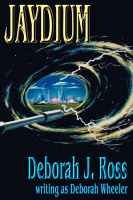Today's guest post comes from Janice Hardy's "Fiction University."
How to Tell if You Should You Give Up On Your Novel and Write Something New
Not all novels need to be written. Is yours one of them?
Right after my third novel was published (2011), I hit a bad patch of writing. My muse went on vacation, every sentence I typed was a battle, and writing became a chore I dreaded. Although it felt like giving up, I shifted my writing focus to nonfiction until telling stories became fun again. Eventually it did, but it took years.
I wrote a lot of so-so novels during that time. Every single one was based on an idea I loved, but they needed a lot of revising and overhauling to make them work, and I wasn’t sure if revising them yet again was a good idea or not.
Idea #1 frustrated me for two and a half years of revisions. Idea #2 took another two years of my life that went nowhere. Idea #3 was a NaNo project that actually made writing fun again, but then languished when I wasn't sure what to do with it next. It was outside my regular genre and market, and trying to sell that one felt like I was starting over again as a writer.
I wanted to make those novels work. The stubborn side of me needed to make them work—it became a grudge match. But going back to them risked me falling back into that same bad patch of frustration that made me hate writing.
Is it wise to keep struggling with a novel that might never work, or is it better to work on something new?
This is a tough call for any writer. We put so much effort into a manuscript, and it’s hard to let that go. All that work. All that creative energy. Just gone. It’s easy to understand why we hold on tight and refuse to let go, even if deep down, we know we should. The manuscript is drowning, and it’s dragging us under with it.
If you're facing a similar choice, here are some things to consider:
1. How much work does the manuscript really need?
Sometimes the only way to make a novel work is to trash everything but the idea and start fresh. Which means, if it usually takes you two years to write a novel, it'll likely take you that long to to do a full re-write. Don't con yourself about this (it's SO easy to do)...if all the manuscript needed was a few months of tweaks, you probably would have done that already.
Take some time and look at what needs to happen to make the novel work. Really understand what you're getting yourself into by staying with it. Do you really want to put that much more work into this idea? There's no wrong answer here, This is about you.
For example, for my books, Idea #1 needed a different protagonist, a deleted POV character, and a plot revamp. Half the book would have to be rewritten, and the other half revised to make the new parts work. Idea #2 needed a total rewrite from the plot up. The plot direction was what didn't work. Idea #3 just needed the normal amount of revising.
(Here’s more on 3 Ways to Tell if a Manuscript Is Worth Going Back to)
2. What are the odds that working on this manuscript will trigger the same frustrations as before?
Be honest. If you're breaking out in a cold sweat just thinking about it, that's a pretty good indication you should move on to something new. But if there's a glimmer of excitement at finally getting this project to work, maybe it's worth giving it another shot.
How do you feel about the novel? What emotions does it trigger in you? Is it keeping you from writing?
For me, Idea #1 carried a very real risk of plunging me back into darkness. There was just so much baggage associated with it, and even though I loved the idea, and I thought I could rework it in six months, I'd thought that before. Idea #2 didn't have that same risk. I could start over there and be okay. It wasn't the book that made me dread writing, so it didn't have the same emotional triggers. Idea #3 was fun to write, and probably fun to revise.








